BOONE, N.C. — For the second consecutive summer, graduate students in Appalachian State University’s helping professions programs learned therapeutic techniques by working with a group of four-legged clients at Lazy Acres Farm in Morganton. According to Dr. Jill Van Horne, who led the intense, weeklong Equine Assisted Learning and Psychotherapy course, Appalachian is among only a handful of universities in the U.S. to offer such an opportunity.
“Due to the hands-on, experiential learning aspect of this course, students will be engaged more fully using a multisensory approach to learning,” said Van Horne, assistant professor in Appalachian’s Department of Human Development and Psychological Counseling and director of the department’s professional school counseling master’s program.
Van Horne, who partnered with Beth Allen, equine specialist and owner of Lazy Acres Farm, to facilitate the class, said the horses were used specifically for their lack of bias. “Their only concern is always fight or flight,” Van Horne said. “Therefore, it is an ideal approach of modeling how therapeutic techniques ought to work with clientele from diverse backgrounds.”
“Also, equine assisted learning and psychotherapy is a unique, innovative approach to mental health therapy impacting clients in beneficial ways that other therapeutic approaches may not; therefore, students getting ready to enter into the profession will have information regarding this approach and have a greater self-awareness going into the field of helping professions,” she added.
Ten students in Appalachian’s clinical mental health counseling, professional school counseling, social work and marriage and family therapy master’s programs were enrolled in the course. Some students expressed they signed up for the course due to a desire to specialize in equine assisted therapy while other students said they plan to apply the concepts learned in the course in other types of counseling settings.
“I’m here because there is no one linear way to work with people,” said Calvin Craig, of Raleigh, who is pursuing his master’s degree in professional school counseling at Appalachian.
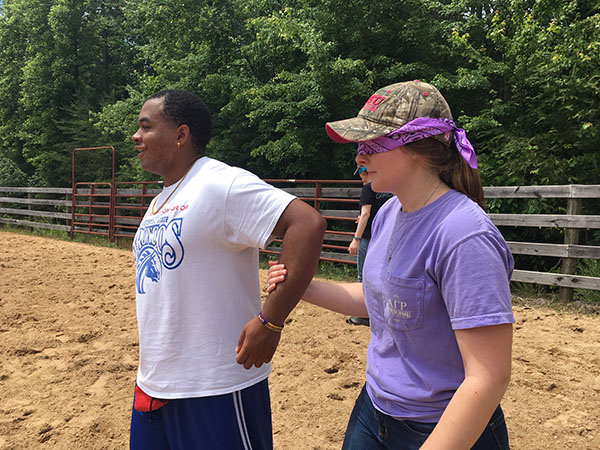
Calvin Craig, left, and Jessica Boyles, both students in Dr. Jill Van Horne’s Equine Assisted Learning and Psychotherapy course, participate in a trust-building activity in the arena at Lazy Acres Farm. Boyles, of Swannanoa, and Craig, of Raleigh, are both graduate students in Appalachian’s professional school counseling program. Photo by Rebekah Saylors
For alumna Jessica Crandell ’16, a graduate student in Appalachian’s clinical mental health counseling program from Knightdale, her end goal is to be an equine specialist, she said.
Through an exercise focused on observation and description, Van Horne said the students gained the skill of trust, but also the skill of describing a behavior without interpretation.
The format of lesson began with instructions, with an emphasis on safety, followed by observations in the arena with the horses. During the class activity, students were paired and stood at various locations within the arena. One partner was blindfolded while the other described what the horses were doing in the arena. A wrap-up through group discussion was held after the exercise.
“My hope is that students are able to apply concepts to clients, making our students better therapists,” Van Horne said. “Essentially they are transferring the skills from this experience to the profession.”
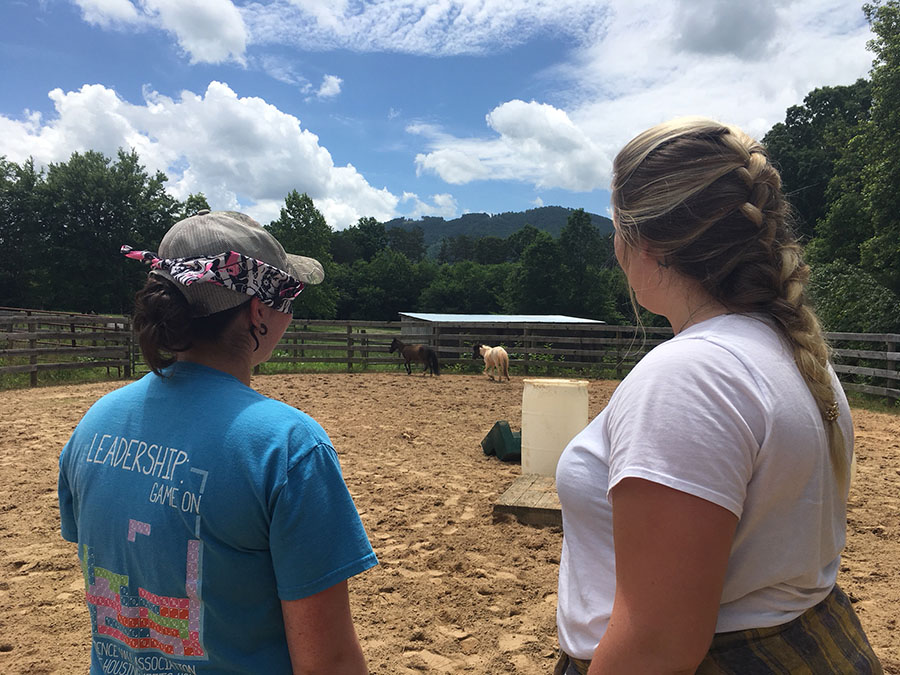
Graduate students Jessica Crandell ’16, left, and Danielle Joyce observe the horses at Lazy Acres Farm during the Equine Assisted Learning and Psychotherapy course. The seeing student practices describing the horses’ actions to the blindfolded student using plain language. Through this trust-building exercise, students learned how to describe behavior without interpretation. Photo by Rebekah Saylors
Hunter Adams, of Charlotte, who is a graduate student in the marriage and family therapy program at Appalachian, described her experience at the farm: “Today I was able to walk into a ring with a wild mustang who has only had human contact for a month.
“I learned a lot about being a therapist in this single interaction. I learned that even though I may want something to happen (pet the mustang), I’m not in charge. The mustang let me know when she was ready and then the connection was real and meaningful.
“Dropping my agenda allowed the interaction to be natural and made her (the mustang) more comfortable with me in her space. Today was a great day.”
Samantha Elam, a graduate student in the professional school counseling program from Greensboro, said, “At the beginning of the week, I was skeptical about the emotional impact this kind of therapy would have on a client. However, on the last day we were able to work with a real client on the issue of letting go and control.”
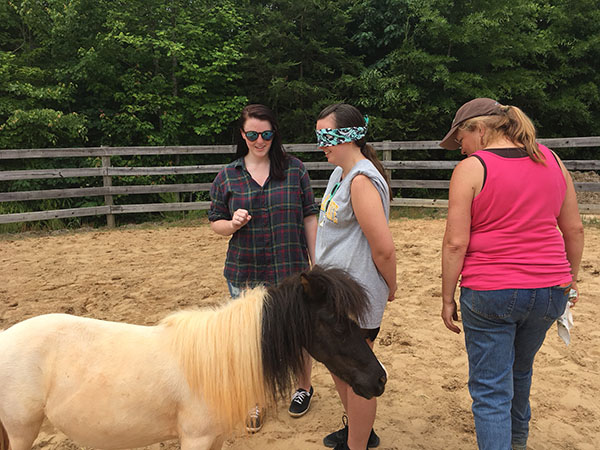
Beth Allen, owner of Lazy Acres Farm, far right, observes students Abby Cozart, far left, and Heather Baker during a class exercise with one of the miniature horses and provides feedback. Cozart, who is from Salisbury, is a graduate student in Appalachian’s social work program, and Baker, of Youngsville, is a graduate student in the professional counseling program. Photo by Rebekah Saylors
About graduate education at App State
Appalachian State University’s Williams School of Graduate Studies helps individuals reach the next level in their career advancement and preparedness. The school offers 80 graduate degree and certificate programs — both in person and online — in a range of disciplines, including doctoral programs in education (Ed.D.) and psychology (Psy.D.). The graduate school enrolls nearly 2,000 students. Learn more at https://graduate.appstate.edu.
About the Reich College of Education
Appalachian State University offers one of the largest undergraduate teacher preparation programs in North Carolina, graduating about 500 teachers a year. The Reich College of Education enrolls more than 2,000 students in its bachelor’s, master’s, education specialist and doctoral degree programs, with offerings that span multiple fields — from teacher preparation, counseling, and therapy, to higher education, school and student affairs administration, library science, educational leadership and more. With over 10,000 alumni employed in North Carolina public schools, there is at least one Reich College graduate in every county in the state. Learn more at https://rcoe.appstate.edu.
About Appalachian State University
As a premier public institution, Appalachian State University prepares students to lead purposeful lives. App State is one of 17 campuses in the University of North Carolina System, with a national reputation for innovative teaching and opening access to a high-quality, cost-effective education. The university enrolls more than 21,000 students, has a low student-to-faculty ratio and offers more than 150 undergraduate and 80 graduate majors at its Boone and Hickory campuses and through App State Online. Learn more at https://www.appstate.edu.
What do you think?
Share your feedback on this story.

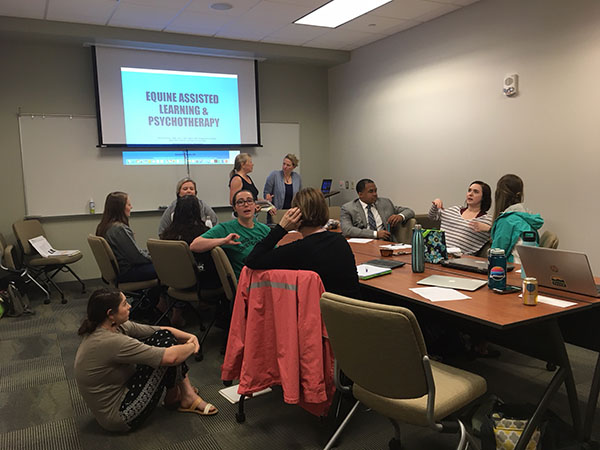
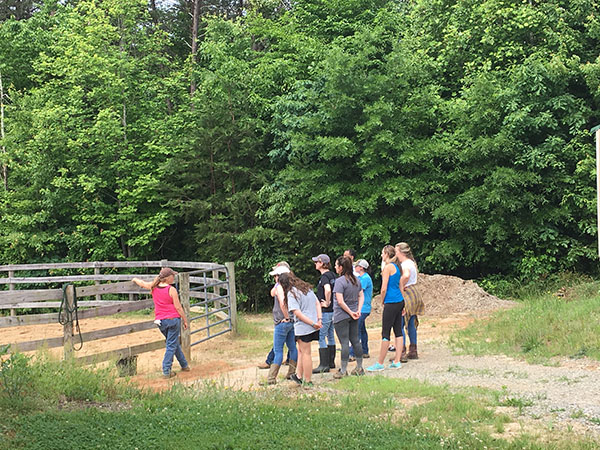
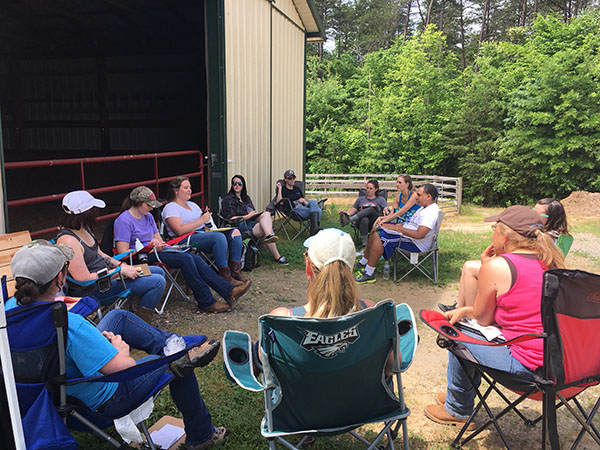
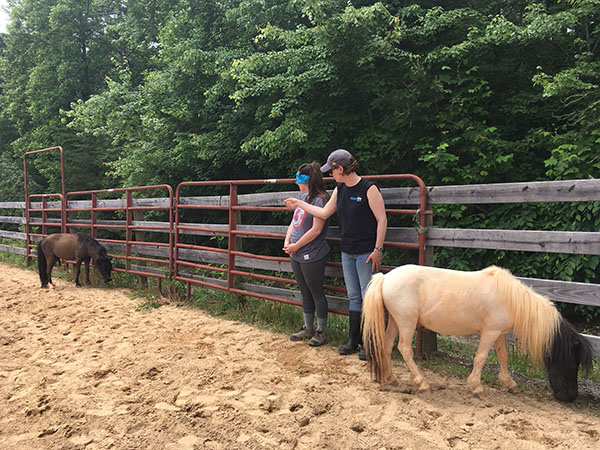


![How NCInnovation Is Rethinking Economic Development in North Carolina [faculty featured]](/_images/_posts/2026/02/rethinking-economic-development-600x400.jpg)








